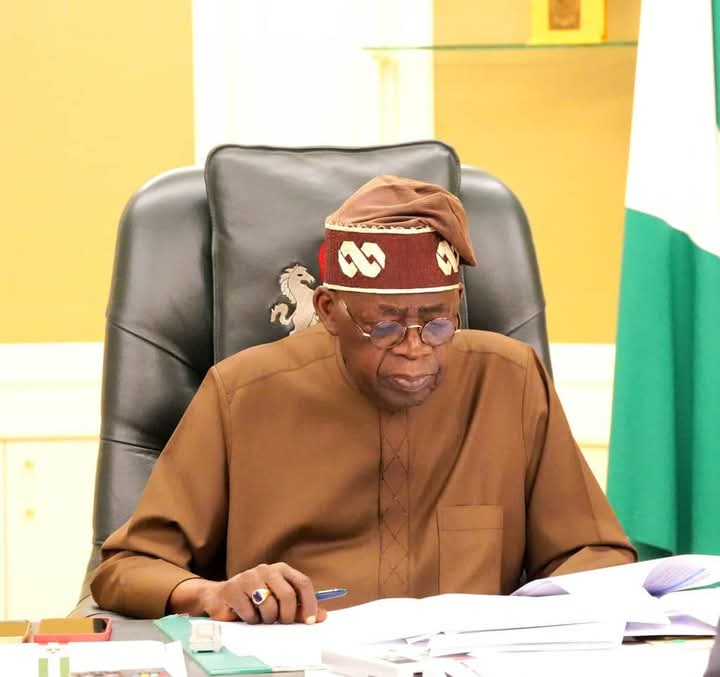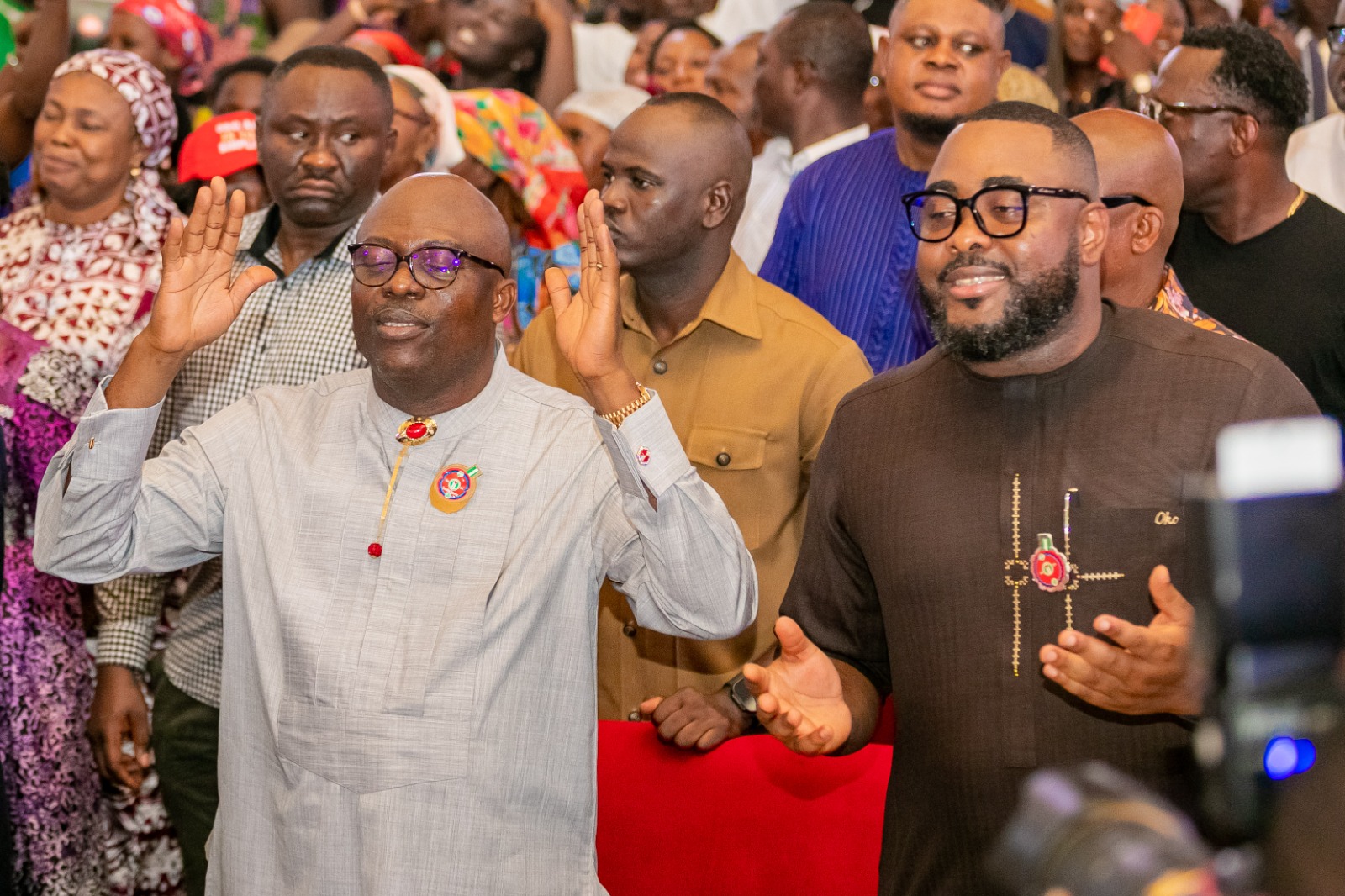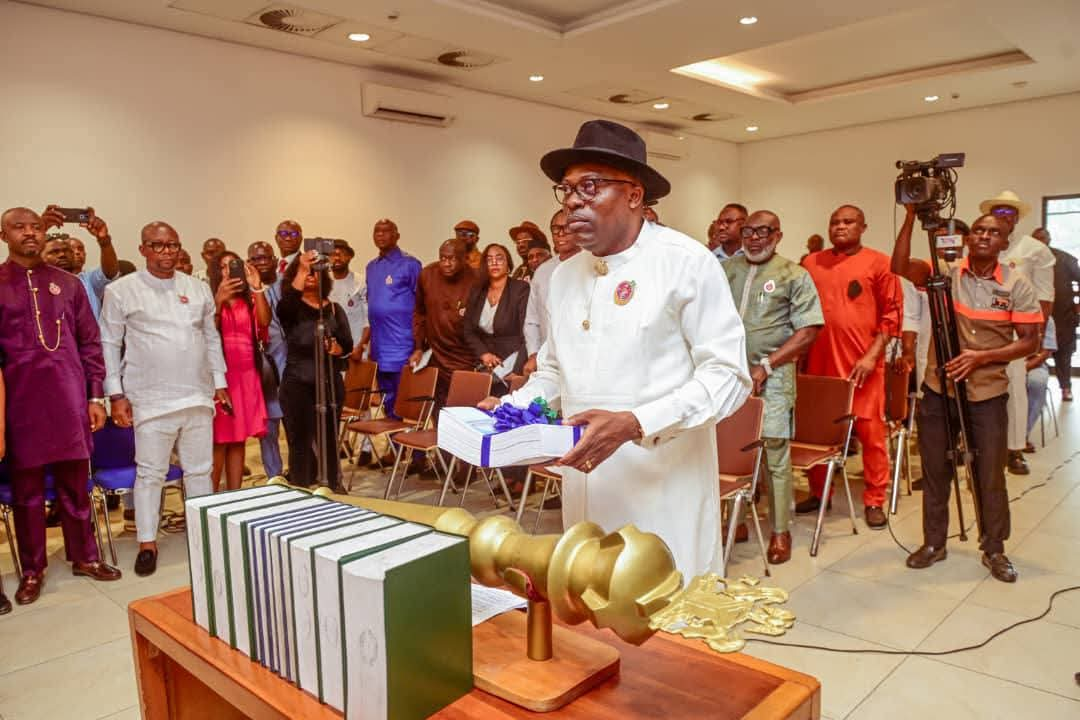Editorial
Happy Easter!

As Christians all over the world mark Good Friday today and Easter on Sunday, rejoicing over the death and resurrection of Jesus Christ, Nigerians must resolve to imbibe the ideals that speak to the season. With our country increasingly torn apart by hate, violence and all manner of social strains, our streets are now overrun by kidnappers, bandits, hired assassins, armed robbers and sundry assortments of troublemakers.
This Easter season presents, more than at any time in our recent history, a unique opportunity to define a new order for justice, service, peace, respect for human dignity and mutual understanding. Easter Sunday is a special proclamation of the bodily resurrection of Jesus Christ. After over two thousand years, his resurrection is still the best news in history.
Jesus Christ is alive! The glorious fact of Him, the great truth of Him, rises up like lightning in the hearts of His followers everywhere. Modern philosophers prefer to stress Christ’s earthly ministry, or the Cross, or even humble birth. But the Christian faith is based on the fact of the resurrection; the New Testament was written in terms of the resurrection, and the early Church lived in the light of the resurrection.
Commemorating the death and resurrection of Jesus Christ and redeeming mankind on the Cross of Calvary are significant. But the essence of the occasion should not be limited to believers only. It is a time for all Nigerians to reflect on what is wrong with us as we witness, almost daily, a mindless orgy of violence that has put our nation under a serious siege. Easter offers a unique opportunity to interrogate the killings, maimings, banditry and other forms of bloodletting while working to find solutions to the challenges they pose.
Sadly, the impression today is that Nigerians are on their own, for while the generality of people is watching the unfolding national mega-crisis with fear and consternation, angst and frustration, the leadership fiddles along with mind-boggling ineptitude and a perplexing degree of arrogant posturing. Meanwhile, the hopes of our bountiful population of young people are dashed and their aspirations for meaningful life are abruptly interrupted halfway through.
The world continues to witness the shadows of COVID-19, racism, family violence, gender inequality, electoral violence, etc. But Christians are called to be the light of all these dark manifestations. Jesus’ death and resurrection are the reason why we know there is an answer to the darkness and fragility of this world. There is hope and salvation. There is a light, and it cannot be overcome. It is a message that will serve us well as a nation.
Nigerians are invited to imitate the exemplary life of humility, self-denial, patience and sacrifice of Jesus Christ who died on the Cross. As a people, we must start to reproduce that kind of sacrifice for the common good, which is the real meaning of Easter. For us in Nigeria, especially at a time like this, we have to erect effective ramparts against the current surge of violence and unbridled individualism. Government officials should also realise that politics is basically a service to the people.
On a special day like this, it is essential to remember that Christ spent his entire life and ministry with the poor, the weak and the oppressed. He shared their anguish, their hopes and aspirations. He fed the hungry with the best grain, and healed the sick, comforted the sorrowful, and wept for the dead. These are attributes worthy to be imitated by leaders and all Nigerians as we celebrate Easter.
More importantly, the new wave of insecurity and spilling of blood in our country is a further invitation to all compatriots to join hands in building a new civilisation of love that eschews hatred, violence, rancour and acrimony across the divides. While Easter Sunday is important for Christians, its message of salvation by faith is the essence of hope, regardless of religious belief.
Friday’s death on the Cross and the Resurrection Sunday symbolise for Christians the ultimate victory of life over death. The risen Christ brought to the world hope, faith and love, and adherents are enjoined to always seek love. If only humanity took note of this message, this world would be a better place to live. So, in this Easter season, The Tide invites all Nigerians to renew hope and faith in the country while relating with others in love.
On this Easter, we must recognise that our country is full of opportunities. If we can manage the present disunity and re-order our tribal loyalty which is currently stronger than our sense of nationhood and navigate out of the dangers of disintegration, it will usher in a great new nation where peace and love shall reign supreme. But this feat can never be achieved without acknowledging that no country enjoys lasting peace without justice, stability and equity.
There is a need for a deliverer like Jesus Christ who lived and preached love, peace, compassion, justice, truth, humility, non-violence, and who died so that his people may find life. For all those in our climes who still believe in the ascendancy of truth over falsehood, in the supremacy of good over evil, and the ultimate triumph of light over darkness, the example of Jesus now being celebrated at Easter suffices to offer the much-needed hope for a distressed and traumatised people.
Part of what the Christian celebration of Easter is all about is hope. Regardless of the severity of our circumstances, Easter challenges men and women to always remain hopeful. The lessons of history assure us that many societies, once struck by violence and other destructive forces, have from time to time been transformed and have become tranquil and peaceful. May this Easter awaken in each one of us the real joy manifested in the devoted service and love for our compatriots. Happy Easter!
Editorial
No To Hike In Telecom Tariffs

Nigerians are outraged by the Federal Government’s approval of a 50 per cent increase in telecommunications tariffs, with organised labour threatening to mobilise workers to boycott telecom services. The Nigeria Labour Congress (NLC) and the Trade Union Congress of Nigeria (TUC) have described the upcoming tariff as outrageous, lamenting that it will worsen the already harsh living conditions of workers and the masses.
Similarly, the Coalition of Northern Groups (CNG) rejected the hike, stating that it was ill-timed and did not take into consideration the struggles of Nigerians. The Human Rights Writers Association of Nigeria (HURIWA) also criticised the review, calling it an illegal, unconstitutional, and oppressive policy that undermines the fundamental rights and freedoms of Nigerians. It is a difficult moment for the industry.
Recall that the Nigerian Communications Commission (NCC) approved a 50 per cent increase in tariffs for telecom operators last Monday, instead of the 100 per cent raise that operators had requested. This decision quickly angered the consumers’ association, which criticised the government’s approval as not only punitive but also insensitive.
We wholeheartedly agree with the stance of labour and other groups on this very sensitive matter. We unequivocally condemn the 50 per cent increase in telecom tariffs. Though telecom operators cite higher operational costs and inflation as reasons for the hike, the timing and impact raise serious concerns in the current economic situation. It is a blatant attack on the well-being of the Nigerian worker and a betrayal of the people to corporate interests.
Telecommunication services are essential for daily communication, work, and access to information. However, the average Nigerian worker already spends approximately 10 per cent of their wages on telecom charges. For a worker earning the current minimum wage of N70,000, this means an increase from N7,000 to a staggering N10,500 per month or 15 per cent of their salary, a cost that is unsustainable.
This hike exemplifies the government’s apparent ease in prioritising corporate profits over citizens’ welfare. It is shocking that the government approved a 50 per cent tariff increase for telecom companies within a month, yet took nearly a year to approve the recent minimum wage for workers, despite the rising cost of living and inflation eroding purchasing power.
The questions are: When will the government stand up for the citizens it swore to protect? When will the National Assembly rise to its responsibility and hold the Executive accountable for policies that blatantly undermine the welfare of the majority? When will the common man finally heave a sigh of relief in Nigeria? We urge the government, the NCC, and the National Assembly to review the implementation of this ill-advised increase.
It is difficult to understand the state of mind of the managers of the nation’s economy. Sadly, these managers have alienated themselves from the reality of today. How can a government approve a 50 per cent hike in the tariff of telecom services when even the N70,000 minimum wage has been eroded by inflation, electricity tariff hikes, exorbitant fuel costs, transportation, and other social services?
Even if there is a need for an increase, why does it have to be 50 per cent? If, after dialogue, it is agreed that a raise is necessary, we should all consider a more reasonable increase rather than the 50 per cent hike. Fifty per cent is excessive and will only worsen the already harsh living conditions of workers, placing a heavier burden and more suffering on them and the general population.
The recognition of telecommunication services as essential components of modern society cannot be overstated. In an era characterised by rapid digital transformation, these services are fundamental not only for personal communication but also for facilitating broader socio-economic engagement. The proposed tariffs increase in the telecom sector raises critical concerns regarding equitable access to vital services that support communication, education, healthcare, and commerce.
In a democracy, the people should be the central focus of all government actions and policies. Every decision should aim to improve their quality of life. This plan must be carefully scrutinised with the welfare of citizens in mind. An increase in telecom tariffs will negatively impact many Nigerians, as the internet has become an essential tool for business, communication, and daily activities.
The Tide calls for the immediate suspension of the 50 per cent hike in tariffs. Instead, we recommend a more reasonable adjustment of a maximum of 10 per cent, which balances industry sustainability with the current economic realities in the country. We also demand that the NCC engages in genuine, inclusive consultations with consumer advocacy groups, civil society organisations, and other grassroots stakeholders before implementing any tariff adjustments.
Editorial
Hurray, Siminalayi Fubara Is 50!

Born on January 28, 1975, in Opobo Town, Mr. and Mrs. Joseph and Love Fubara welcomed their second of five children and first son. His father, a former soldier who completed an overseas training tour of duty, instilled in him a strong sense of discipline and dedication. His mother, a civil servant, taught him the importance of hard work and perseverance.
He received his primary education at Opobo Primary School and continued his studies at Comprehensive Secondary School in Opobo. His passion for numbers led him to pursue a degree in Accountancy at the then Rivers State University of Science and Technology, now known as Rivers State University.
Upon completion of his Bachelor’s degree, he pursued further education and obtained a Master of Business Administration (MBA) and a Master of Science (MSc) from the prestigious University of Port Harcourt in 2013 and 2016, respectively. Fubara’s dedication to his studies and his commitment to personal growth have shaped him into the accomplished individual he is today.
Sim, fondly called by his colleagues, started his career in 2003 as a principal accountant at the Rivers State Senior Secondary Schools Board. His dedication led to his promotion to Director of Finance and Accounts at the Government House in 2015. In March 2020, he was appointed Permanent Secretary and then became the Accountant-General of Rivers State on December 23, 2020.
His achievements are numerous, as he is a Knight of the St. Christopher (KSC) Order of the Church of Nigeria Anglican Communion. Additionally, he holds the prestigious traditional chieftaincy title of Amaopusenibo of Opobo Kingdom. The Governor’s commitment to family is evident through his marriage to Valerie Ibiere Fubara, with whom he shares three beautiful children.
Among Siminalayi’s other significant qualifications and accomplishments are his fellowship with the Nigerian Institute of Management and his fellowship with the Association of National Accountants of Nigeria (ANAN). He holds membership in the Chartered Institute of Forensic and Investigative Auditors. His impressive background has gained him the trust and support of the Peoples Democratic Party (PDP), leading to his victory in the party’s governorship primaries for the 2023 general elections.
Fubara embodies a leadership style defined by simplicity and compassion. He exhibits patience, confidence, and empathy in his interactions with those he serves. His humility and faith in God make him trustworthy. Representing the younger generation, Sim leads with the slogan “Consolidating and Continuing the New Rivers Vision,” focusing on developing infrastructure, healthcare, education, security, agriculture, and investment opportunities for Rivers State.
The bravery exhibited by His Excellency in resisting godfatherism has attracted respect from a wide array of Nigerians, Africans, and supporters of democracy around the world. He emphasises serving the interests of the people of Rivers over any godfather. His actions unify diverse groups in the state, promoting a sense of belonging among various ethnicities.
Our affable Governor exemplifies robust moral leadership rooted in his Christian beliefs. As a devoted Knight, he shows compassion and selflessness in his governance. He fosters an environment where all religions can peacefully coexist. Fubara sponsored Muslim pilgrims for the 2024 Hajj and personally wished them well, encouraging them to pray for the state and Nigeria. His religious tolerance has earned him respect among Nigerians who value coexistence.
Moreover, the Governor’s appealing physique and charming smile have garnered admiration from many Nigerians, who view physical beauty as a reflection of inner qualities. His tall stature has solidified his status as a revered figure, commanding respect across the nation. Fubara has shown dedication to women’s issues by initiating several programmes in collaboration with the Women Affairs Ministry and the Office of the First Lady, highlighting his strong commitment to women’s empowerment and gender equality.
Sir Fubara has focused on actively involving young people in his governance by launching entrepreneurship and training schemes, notably the Rivers State Youth Empowerment Scheme. His efforts to support youth have earned him the backing of many young Nigerians. Additionally, he provides scholarships and makes donations to orphanages, demonstrating his commitment to investing in education for the benefit of children in the state.
Known for his strong commitment to national unity, this Governor reaches out to Nigerians from various backgrounds. As a state Governor, he demonstrates great nationalism by supporting citizens from other states, especially in Rivers. He respects the rule of law and democratic values, which has enabled past local government chairmen to complete their terms without issues. His effective management of Rivers State’s resources promotes transparency and accountability.
Despite facing numerous distractions, the Rivers Chief Executive has made remarkable strides in steering the state’s affairs, reflecting his unwavering focus and commitment to delivering results. He has encountered challenges but remains dedicated to his vision for a better state. His peaceful and caring leadership style has made him popular, inspiring new leaders to emulate similar qualities. By being strong yet compassionate, he has redefined the concept of leadership. Fubara’s selfless nature prioritises the state’s needs above his own. This has earned him widespread support.
As he commemorates his Golden Jubilee birthday today, even the most ardent critics, adversaries, and accusers cannot overlook that he embodies a worthy precursor in every sense.
Happy Birthday, His Excellency!
Editorial
Fubara’s 2025 Budget Of Inclusive Growth

-
News5 days ago
TotalEnergies On Red Alert As Ekpeye Monarch Dissolves UCA
-
Rivers5 days ago
RSG Seeks Stakeholders’ Collaboration For Women, Children Improvement
-
Niger Delta5 days ago
Speaker, Delta Assembly urges NUJ to check quacks
-
Nation5 days ago
UNIZIK Lecturers Protest Non-Payment Of Salaries For Five Years
-

 Featured5 days ago
Featured5 days agoI Won’t Allow Spoils Of Office To Change Me – Fubara …As Rivers People Mark Gov’s 50th Birthday With Prayers
-
Business5 days ago
Nigeria Losing $40b Annually From Maritime Sector – NIMENA
-
Business5 days ago
Expert identifies UNICEEF’s NLP As Spring Board To AI In Benue
-

 Niger Delta5 days ago
Niger Delta5 days agoCommissioner Hails RSHA Speaker Over Promise Of Constituency Projects To Ogu/Bolo

